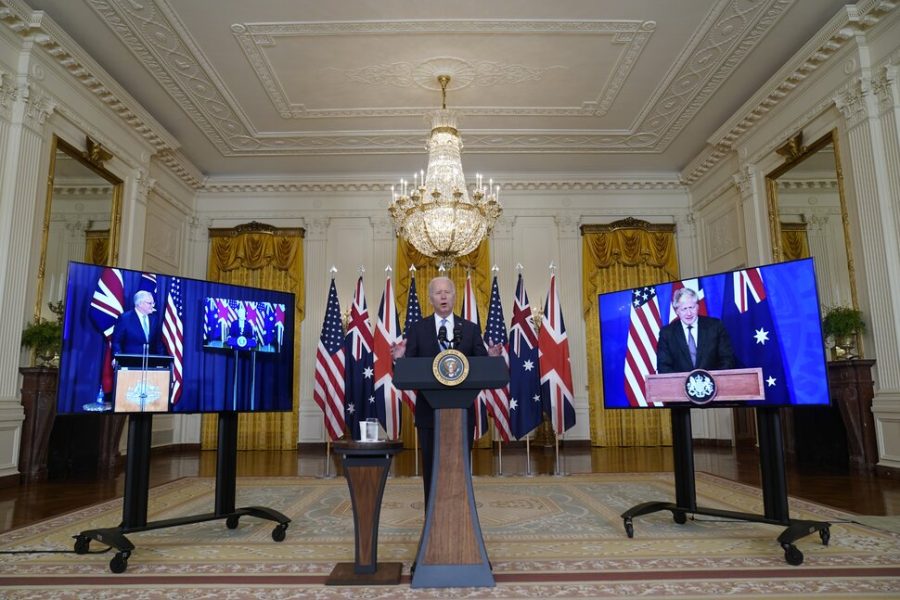AUKUS Deal Was a Mistake
In early September 2021, the Australian Broadcasting Corporation reported a new deal between Australia, the United Kingdom and the United States which would, among many other things, send the technology for nuclear-powered submarines to Australia. As The Economist analyzed, these submarines will be able to submerge for as long as their crew can be fed and have the capacity to launch missiles to hit targets at incredibly long ranges, though they will not be nuclear armed. Australia is the second country in the region, after China, to obtain this technology, and the deal is slated to give them enough submarines to match China’s own suspected numbers. In short, the agreement gives enormous capabilities to Australia. It also deepens the relationship between these three countries. While they already share intelligence through the Five Eyes alliance, according to The Print, the trust that these two countries are showing towards Australia by making a deal for very sensitive information shows that these nations likely share a vision for an Indo-Pacific strategy. Both the enhancement of Australia’s capabilities and a stronger relationship between these three nations are positive motions and should be celebrated. Matching the capabilities of an increasingly aggressive China in the South China Sea, granting a reliable ally capable and useful technology and being on the same page with key allies about the Indo-Pacific region are just a few of the reasons why. But the agreement still has its fair share of critics.
The first principal concern is that this agreement is creating an arms race in the region between allies of the United States and China. However, as noted previously, the United States and the United Kingdom are not introducing a new technology into the region or one that is uniquely powerful. China already has this technology, and now their capacities are just being matched. If China develops its arsenals further in light of AUKUS, it will not be because the agreement created an arms race but rather because they want to maintain military dominance in the region. Other countries should not be forced to keep their militaries inferior simply because China will want to maintain regional hegemony. Furthermore, China is the provocateur in the region and has been since long before AUKUS was even planned. As The Economist noted, China has destroyed reefs in order to make artificial islands and infringe upon the exclusive economic zones of countries like the Philippines. Furthermore, its air force infringes upon the air space of other nations and territories like Malaysia. All of this is not to say that the sole reason for AUKUS is to combat China, while that certainly is one dimension of it. It is merely to emphasize that China does not have the right to say that Australia is escalating things when China has been an aggressive bully in the region for years.
The second principal concern is about how this deal came to be. As CNN reported, the Australians originally had an agreement with French company Naval Group in which the French government has a majority stake. According to The Economist, this deal was specifically for diesel powered submarines and was worth tens of billions of dollars. As recently as Aug. 30, the Australian government was still lying to the French government and pretending as though they continue to be willing to go along with this deal, all the while negotiating and agreeing to AUKUS. Politico noted that, when the announcement of the new agreement came out, the French were blindsided in a move that the French foreign minister, Jean-Yves Le Drian, referred to as a “stab in the back.” This is no way to treat our allies. France has been America’s oldest ally, and a blow to trust between them, as well as between France, Australia and the United Kingdom, not only harms the relationship as a whole but also suggests that all four countries could assemble a coherent and unified strategy in the Indo-Pacific region. Furthermore, this betrayal is of Emmanuel Macron, the current president of France, who has been outspoken about the need for alliances. Now, Macron must go into an election year trying to explain why France’s closest allies betrayed her and, in The Economist’s analysis of the Atlantic Council’s Benjamin Haddad, destroyed the “underpinning of France’s Indo-Pacific strategy,” It is not inconceivable that France might grow more isolationist as a result of this betrayal and humiliation. It may even turn towards one of its far right figures, such as Marine Le Pen and Eric Zemmour, both of whom want the nation to withdraw from the North Atlantic Treaty Organization, or NATO, which would be an enormous gift to the Russian Federation’s President Putin.
What started as a submarine deal for Australia could quickly spiral into one of Europe’s largest economies and militaries leaving the unified front against Russian aggression, right when the nation is amassing troops on its border with Ukraine. But even if it does not, the betrayal will remain a terrible mistake by the Biden Administration. The AUKUS deal itself is very worthwhile, but America should not burn some bridges to fortify others. Such a strategy will leave it worse off than when it started.









